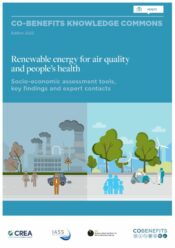Socio-economic assessment tools, key findings and expert contacts

Connecting policymakers with expert organisations to assess and unlock air quality co-benefits
Air pollution, primarily from coal-fired power plants, is one of the main impacts that the energy sector has on the environment and human health. The health impacts of greatest concern include heart disease, lung cancer, stroke and chronic obstructive pulmonary disease. The consequences of such diseases include increased levels of morbidity, which further result in elevated health costs, as well as loss of productivity.
With this fact sheet series, we seek to present the state of the art in assessing air-quality co-benefits, interconnecting climate friendly power planning, air quality and public health.
Co-benefits Knowledge Commons: Renewable energy for air quality and people’s health
Year of publication: 2022
Published by the COBENEFITS project in collaboration with the Centre for Research on Energy and Clean Air (CREA)
Edited by Franziska Sperfeld, Sarah Kovac, Sophie Dolinga, Laura Nagel, Héctor Rodríguez – UfU and IASS